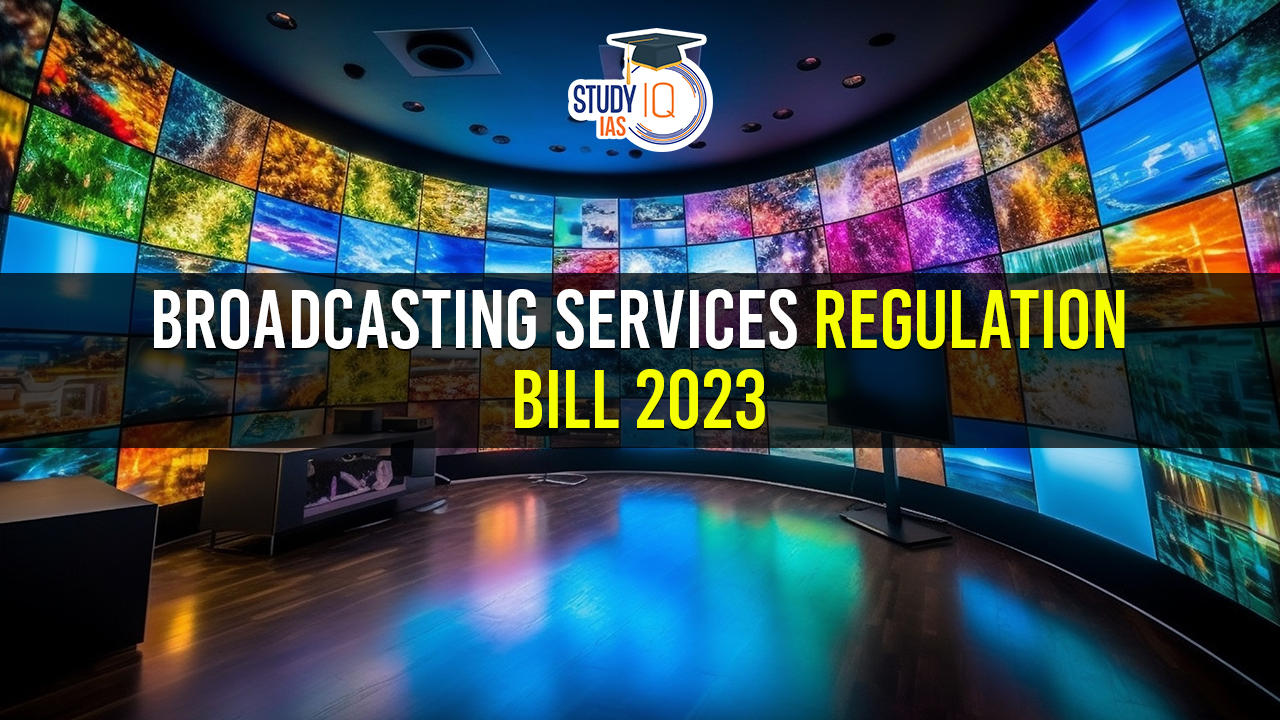Table of Contents
Context:
The Broadcasting Services (Regulation) Bill, released in November by India’s Ministry of Information and Broadcasting (MIB), represents a continuation of efforts to establish an integrated regulatory framework for broadcasting. This effort dates back to the Broadcasting Bill of 1997, followed by the Broadcasting Services Regulation Bill of 2007. The current Bill follows a pre-consultation paper on the ‘National Broadcasting Policy’ by the Telecom Regulatory Authority of India (TRAI), initiated by the MIB.
Broadcasting Services Regulation Bill 2023
The Unified Regulatory Framework for Broadcasting bill aims to modernise the regulatory framework for broadcasting in India. The Broadcasting Services Regulation Bill 2023 replaces the outdated Cable Television Networks Act of 1995 and expands regulatory oversight to encompass over-the-top (OTT) content, digital news, and current affairs, which are currently regulated under the IT Act, of 2000.
We’re now on WhatsApp. Click to Join
Key Aspects and Concerns of the Bill
- Record Maintenance and Audits: The Bill requires broadcasting network operators and broadcasters to keep subscriber data records and subject them to periodic external audits.
- Audience Measurement and Sale of Ratings: It aims to establish a methodology for audience measurement and the sale of ratings data to improve transparency in the cable and satellite television business.
- Privacy Concerns: There is a lack of provisions to protect the privacy of subscribers and audiences in data collection practices.
- Private Actors in Terrestrial Broadcasting: The Bill allows private entities in terrestrial broadcasting, potentially reducing the diversity of suppliers in broadcasting.
Other Apprehensions and Issues:
- Inclusion of OTT Content Suppliers: The Bill includes OTT content suppliers in the definition of broadcasting services, which overlaps with the jurisdiction of the Ministry of Electronics and Information Technology (MEITy) and raises concerns about the regulatory architecture.
- Impact on News Media and Journalists: The expanded definition of broadcasting may constrain journalists and news outlets, especially those not part of large networks.
- Internal Oversight Mechanism: The Bill mandates an internal body to self-certify news programming, raising questions about feasibility, costs, and desirability.
Silences in the Bill:
- Ownership Issues: The Bill does not address cross-media and vertical ownership issues, which can affect diversity in news.
- Independent Broadcast Regulator: There is no mention of establishing an independent broadcast regulator, which could address viewers’ grievances and violations of codes effectively.
Government Powers and Press Freedom:
- Inspection and Equipment Impoundment: The government is empowered to inspect broadcasters and impound their equipment without prior notice.
- Content Control: The Bill allows for deleting or modifying content for violations of codes, in addition to existing measures like ceasing transmissions.
- Undefined Public Interest: The government has the leeway to curtail broadcasting in the undefined “public interest,” potentially impacting press freedom and diversity.
Key Features Of Broadcasting Services Regulation Bill 2023
- Contemporary Definitions and Future-Ready Provisions: The bill introduces comprehensive definitions for modern broadcasting terms and incorporates provisions for emerging broadcasting technologies to keep pace with the evolving technological landscape.
- Strengthened Self-Regulation Mechanism: The bill establishes Content Evaluation Committees for self-regulation and introduces a Broadcast Advisory Council to advise the central government on violations of program and advertisement codes.
- Differentiated Program and Advertisement Codes: The bill allows for a differentiated approach to Program and Advertisement Codes across various broadcasting services.
- Accessibility for Persons with Disabilities: The bill promotes the use of subtitles, audio descriptors, and sign language for persons with disabilities and provides for the appointment of a Disability Grievance Officer.
- Penalties: The bill outlines penalties, including advisory warnings, censures, and monetary penalties, for non-compliance. For severe offences, such as obtaining registration with a false affidavit, imprisonment and/or fines may be imposed.
- Equitable Penalties: Monetary penalties and fines are linked to the financial capacity of the entity, taking into account the entity’s turnover and investment, to ensure fairness and equity.
- Infrastructure Sharing Provisions: The bill introduces provisions for infrastructure sharing among broadcasting network operators.
- Dispute Resolution Mechanism: The bill establishes a structured dispute resolution mechanism.
Broadcasting Regulation In India
- Ministry of Information and Broadcasting: The Ministry of Information and Broadcasting (MIB) is the nodal ministry for the Indian broadcasting sector. It is responsible for formulating policies and regulations for the sector, and for overseeing the operations of Prasar Bharati, the public broadcaster.
- Telecom Regulatory Authority of India (TRAI): TRAI is the independent regulator of the telecommunications and broadcasting sectors in India. It is responsible for regulating tariffs, ensuring fair competition, and protecting consumer interests.
- Electronic Media and Monitoring Centre (EMMC): The EMMC is a body established by the MIB to monitor and record the content that is broadcast on television channels in India. It also investigates complaints from viewers about the content of broadcasts.
- Prasar Bharati: Prasar Bharati is the public broadcaster of India. It is a statutory autonomous body set up by Parliament under the Prasar Bharati Act 1990. It operates Doordarshan, the national television channel, and All India Radio, the national radio broadcaster.
- Cable Network Act 1995: The Cable Network Act 1995 governs the registration of broadcasters and distributors of television channels in India. It also establishes a statutory authority to regulate the cable television sector.
Broadcasting Services Regulation Bill 2023 Advantages
- Consolidation and Modernization: The bill replaces the outdated Cable Television Networks Act of 1995, bringing the regulatory framework in line with the evolving media landscape.
- It adopts a unified and future-focused approach, encompassing OTT, digital media, DTH, and IPTV, ensuring comprehensive regulation across all broadcasting platforms.
- Ease of Doing Business: The bill streamlines the regulatory process and introduces a dispute resolution mechanism, fostering a more business-friendly environment for broadcasting entities.
- Digital India Initiative: The bill promotes technological advancement and service evolution in the broadcasting domain, aligning with the government’s vision of a digitally empowered India.
- Right of Way: The bill facilitates the acquisition of Right of Way permissions, enabling cable operators to expand their networks efficiently.
- Infrastructure Sharing: The bill encourages infrastructure sharing among broadcasters, similar to the successful model employed in the telecom sector, reducing costs and improving efficiency.
- Self-Regulation Mechanisms: The bill empowers broadcasters by establishing Content Evaluation Committees, self-certification bodies that promote autonomy in content regulation.
- Ease of Living for Persons with Disabilities: The bill enhances accessibility by promoting the use of subtitles, audio descriptors, and sign language, ensuring that broadcasting services cater to the needs of all individuals.
Concerns and Criticism of Broadcasting Services Bill 2023
- Promoting Linear Representation: The bill’s emphasis on linear representation could lead to the underrepresentation or marginalisation of minority groups, reinforcing a narrow and homogenous national identity. For instance, the provision granting an “authorised officer” the power to prohibit content deemed disruptive or harmful could be misused to suppress diverse perspectives and silence minority voices.
- Questions over “Authorised Officer”: The appointment of an “authorised officer” under government control raises concerns about potential political or personal biases influencing their decisions. The broad discretion granted to this individual could result in arbitrary censorship and curtailment of free expression.
- Application of Same Rules for Different Media:
- The bill’s application of uniform rules to both OTT broadcasting services and traditional media platforms, such as cable TV and radio, overlooks the inherent differences in user choice and consumption patterns.
- Unlike traditional media, OTT platforms provide viewers with the autonomy to select and avoid content, a feature that fundamentally alters the viewing experience.
- Imposing stringent regulations and codes on OTT platforms could increase their financial and compliance burdens, potentially affecting user experience, content diversity, and overall costs for consumers.
- Selective Targeting: Critics argue that the bill’s provisions could be misused to target specific content or viewpoints (like the IT Rules 2021 are being misused to arrest media personnel), rather than serving as a genuine regulatory framework. Instances of government attempt to curb anti-government narratives while allowing populist fake news raise concerns about selective application and potential political manipulation.
Way Ahead For Broadcasting Services Bill 2023
Global Regulations for OTT Services
- A review of OTT regulation across various countries reveals that most lack a comprehensive and legally binding framework.
- A few exceptions, such as Singapore and Australia, have implemented effective regulatory approaches.
- Singapore’s Infocomm Media Development Authority serves as a unified regulatory body for different media, combining statutory regulations, industry self-regulation, and public education initiatives to promote media literacy.
Regulation of Media and the Role of Civil Society
- Emphasising self-regulation within the media industry is crucial to upholding journalistic integrity.
- Government intervention in media regulation risks undermining the very essence of a free and independent press.
- A well-informed, engaged, and active civil society serves as the most effective watchdog over political and media practices.


 Disaster Mitigation Projects in India
Disaster Mitigation Projects in India
 Editorial of the Day (26 July): India's ...
Editorial of the Day (26 July): India's ...
 Kargil Vijay Diwas 2024, Date, History a...
Kargil Vijay Diwas 2024, Date, History a...

















